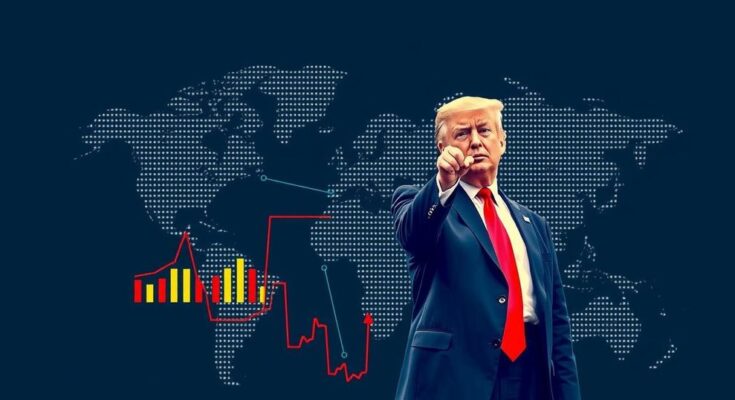Trump’s re-election introduces uncertainty into the global economy with proposed tariffs that may severely impact international trade. Estimates suggest a possible decline in global growth, particularly affecting emerging economies while raising alarms over the Federal Reserve’s independence. The potential for retaliatory actions only exacerbates these concerns, challenging the foundations of globalization.
The re-election of Donald Trump as President of the United States has instigated considerable uncertainty within the global economy, particularly concerning the implementation of significant tariffs. Following his victory in key swing states such as Georgia and Pennsylvania, concerns have arisen over his proposed tariffs of up to 60 percent on Chinese imports and 10 to 20 percent on other foreign goods, potentially leading to profound ramifications for international trade. According to various economic analyses, such measures could substantially hinder global economic growth and adversely affect emerging markets, which are already vulnerable in the current economic climate. The implications of Trump’s protectionist stance could result in reduced purchasing power for consumers and an inevitable backlash of retaliatory tariffs from other nations, further constraining international commerce. Projections from Swiss bank UBS estimate that such tariffs could decrease global economic growth by one percentage point by 2026, with particular detriments forecasted for countries like China and those in the European Union. Additionally, should Trump effectuate his threats, the strengthening of the US dollar due to inflationary pressures could exacerbate economic challenges for non-Western economies, increasing their repayment burdens on dollar-denominated debt. Concerns regarding the autonomy of the Federal Reserve under Trump’s influence have also been highlighted, with experts cautioning that any politicization of federal economic policy could destabilize the worldwide financial system. Consequently, Trump’s evident commitment to aggressive tariff policies not only jeopardizes the principles of globalization but also ignites fears of trade wars that may reverberate globally. In conclusion, the uncertainties stemming from Donald Trump’s re-election pose a significant threat to the stability of the global economy. The potential implementation of high tariffs could provoke widespread economic repercussions, particularly for emerging markets, leading to a slowed growth trajectory that may require prompt and strategic responses from global economic institutions to mitigate the fallout.
The recent re-election of Donald Trump as President of the United States has raised alarms within international economic circles regarding the future of global trade and financial stability. Trump’s victory, reaffirmed through wins in essential swing states, has reignited concerns about his protectionist economic strategies, particularly the imposition of hefty tariffs. Historically, tariffs have been used to shield domestic industries, but they also risk disrupting established trading relationships and may lead to retaliatory measures from affected countries. As globalization faces scrutiny, Trump’s policies could reshape economic practices worldwide, compelling a reevaluation of trade strategies among nations.
The re-election of Donald Trump heralds a new era of economic uncertainty characterized by potential trade conflicts and protectionist policies that threaten the foundation of globalization. His plans for imposing high tariffs may significantly disrupt global GDP growth and disproportionately impact emerging economies already struggling in a precarious economic environment. As nations brace for possible retaliatory measures, the world is left to navigate a landscape fraught with economic volatility and geopolitical tensions.
Original Source: www.aljazeera.com




